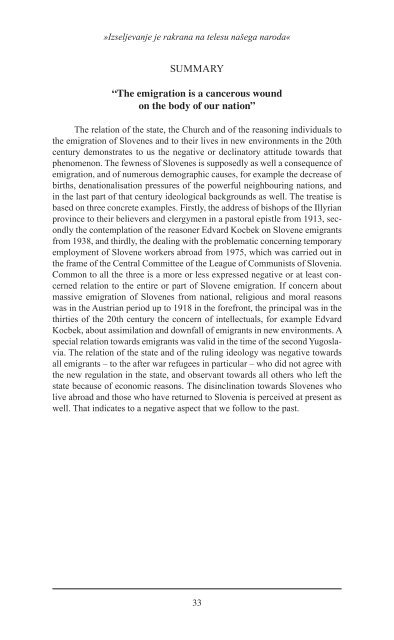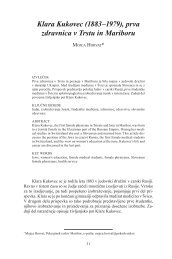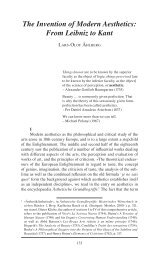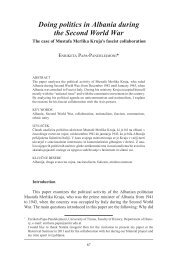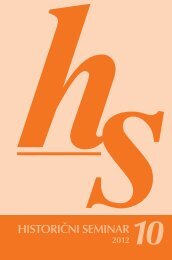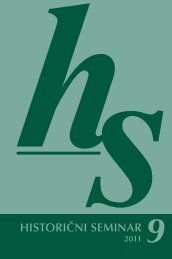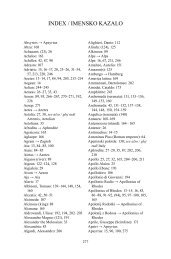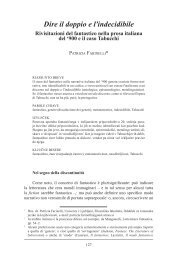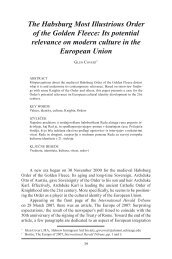- Page 3 and 4: UrediliHistorični seminar 4Metoda
- Page 6: PredgovorČetrti zbornik Historičn
- Page 9 and 10: Marjan Drnovšekizseljenskega vpra
- Page 11 and 12: Marjan DrnovšekSlovenskem) in 59.8
- Page 13 and 14: Marjan Drnovšekda je izseljevanje
- Page 15 and 16: Marjan Drnovšeknpr. v Združenih d
- Page 18 and 19: »Izseljevanje je rakrana na telesu
- Page 20 and 21: »Izseljevanje je rakrana na telesu
- Page 22 and 23: »Izseljevanje je rakrana na telesu
- Page 24 and 25: »Izseljevanje je rakrana na telesu
- Page 26 and 27: »Izseljevanje je rakrana na telesu
- Page 28 and 29: »Izseljevanje je rakrana na telesu
- Page 30 and 31: »Izseljevanje je rakrana na telesu
- Page 32 and 33: »Izseljevanje je rakrana na telesu
- Page 36 and 37: Kanalska dolina:Identitetne politik
- Page 38 and 39: Kanalska dolina: Identitetne politi
- Page 40 and 41: Kanalska dolina: Identitetne politi
- Page 42 and 43: Kanalska dolina: Identitetne politi
- Page 44 and 45: Kanalska dolina: Identitetne politi
- Page 46 and 47: Kanalska dolina: Identitetne politi
- Page 48 and 49: Kanalska dolina: Identitetne politi
- Page 50 and 51: Kanalska dolina: Identitetne politi
- Page 52 and 53: Kanalska dolina: Identitetne politi
- Page 54 and 55: Kanalska dolina: Identitetne politi
- Page 56 and 57: Kanalska dolina: Identitetne politi
- Page 58 and 59: Kanalska dolina: Identitetne politi
- Page 60 and 61: Bosna - zloupotreba historijeŠAćI
- Page 62 and 63: Bosna - zloupotreba historijenačin
- Page 64 and 65: Bosna - zloupotreba historijesu zad
- Page 66 and 67: Bosna - zloupotreba historijedok je
- Page 68 and 69: Bosna - zloupotreba historijeAkadem
- Page 70 and 71: Bosna - zloupotreba historijepoliti
- Page 72 and 73: Bosna - zloupotreba historijena Dri
- Page 74 and 75: Islam in DalmatiaJOSIP VRANDEČIćA
- Page 76 and 77: Islam in Dalmatiafamous oficer Ivan
- Page 78 and 79: Islam in Dalmatiathe Ottoman econom
- Page 80 and 81: Islam in Dalmatiahad all occurred i
- Page 82 and 83: “East is East. West is West”:Fr
- Page 84 and 85:
“East is East. West is West”: F
- Page 86 and 87:
“East is East. West is West”: F
- Page 88 and 89:
“East is East. West is West”: F
- Page 90 and 91:
“East is East. West is West”: F
- Page 92 and 93:
Vidiki uboštva v zgodnjem meništv
- Page 94 and 95:
Vidiki uboštva v zgodnjem meništv
- Page 96 and 97:
Vidiki uboštva v zgodnjem meništv
- Page 98 and 99:
Vidiki uboštva v zgodnjem meništv
- Page 100 and 101:
Vidiki uboštva v zgodnjem meništv
- Page 102 and 103:
Vidiki uboštva v zgodnjem meništv
- Page 104 and 105:
Vidiki uboštva v zgodnjem meništv
- Page 106 and 107:
Vidiki uboštva v zgodnjem meništv
- Page 108 and 109:
Kajkavsko narječje i njegovaprouč
- Page 110 and 111:
Kajkavsko narečje i njegova prouč
- Page 112 and 113:
Kajkavsko narečje i njegova prouč
- Page 114 and 115:
Kajkavsko narečje i njegova prouč
- Page 116 and 117:
Kajkavsko narečje i njegova prouč
- Page 118:
Kajkavsko narečje i njegova prouč
- Page 121 and 122:
Wolfgang ViereckKrankheiten, Brote
- Page 123 and 124:
Wolfgang ViereckAuch der Marienkäf
- Page 125 and 126:
Wolfgang Viereckwichtige Feste im A
- Page 127 and 128:
Wolfgang ViereckPlanzen sind unter
- Page 129 and 130:
Wolfgang Viereckund Große Mutter.
- Page 131 and 132:
Wolfgang ViereckZITIERTE LITERATURA
- Page 134 and 135:
The Invention of Modern Aesthetics:
- Page 136 and 137:
The Invention of Modern Aesthetics:
- Page 138 and 139:
The Invention of Modern Aesthetics:
- Page 140 and 141:
The Invention of Modern Aesthetics:
- Page 142 and 143:
The Invention of Modern Aesthetics:
- Page 144 and 145:
The Invention of Modern Aesthetics:
- Page 146 and 147:
The Invention of Modern Aesthetics:
- Page 148 and 149:
The Invention of Modern Aesthetics:
- Page 150 and 151:
The Invention of Modern Aesthetics:
- Page 152 and 153:
The Invention of Modern Aesthetics:
- Page 154:
The Invention of Modern Aesthetics:
- Page 157 and 158:
Eva Zöllnerrival Samuel Arnold (17
- Page 159 and 160:
Eva Zöllnersuited all parties conc
- Page 161 and 162:
Eva Zöllnerbe assessed by the fail
- Page 163 and 164:
Eva ZöllnerFig.1: Programmes of th
- Page 165 and 166:
Eva ZöllnerOnce a year, indeed, a
- Page 168 and 169:
Introducing Benjamin Britten:Some R
- Page 170 and 171:
Introducing Benjamin Britten: Some
- Page 172 and 173:
Introducing Benjamin Britten: Some
- Page 174 and 175:
Introducing Benjamin Britten: Some
- Page 176 and 177:
Introducing Benjamin Britten: Some
- Page 178 and 179:
Introducing Benjamin Britten: Some
- Page 180 and 181:
Introducing Benjamin Britten: Some
- Page 182 and 183:
Introducing Benjamin Britten: Some
- Page 184 and 185:
Introducing Benjamin Britten: Some
- Page 186:
ZgodovinaSlovenske ljudske stranke
- Page 189 and 190:
Andrej RahtenS tem pa je bil dosež
- Page 191 and 192:
Walter LukanKer pa je bila SLS osre
- Page 193 and 194:
Walter LukanJuhanta, 15 Franceta M.
- Page 195 and 196:
Walter LukanJožef Klekl 35 in Lamb
- Page 197 and 198:
Walter LukanČas do razpada habsbur
- Page 199 and 200:
Walter LukanSlovenska ljudska stran
- Page 201 and 202:
Walter Lukanv primerjavi z Zečevi
- Page 203 and 204:
Trideseta letaWalter LukanCelovitej
- Page 205 and 206:
Walter Lukannjenih knjig o primorsk
- Page 207 and 208:
Walter LukanVolkspartei, mit Einfü
- Page 210 and 211:
Slovenska ljudska strankav parlamen
- Page 212 and 213:
Slovenska ljudska stranka v parlame
- Page 214 and 215:
Slovenska ljudska stranka v parlame
- Page 216 and 217:
Slovenska ljudska stranka v parlame
- Page 218 and 219:
Slovenska ljudska stranka v parlame
- Page 220 and 221:
Slovenska ljudska stranka v parlame
- Page 222 and 223:
Slovenska ljudska stranka v parlame
- Page 224 and 225:
Od petstotih farovžev dooseminsede
- Page 226 and 227:
Od petstotih farovžev do oseminsed
- Page 228 and 229:
Od petstotih farovžev do oseminsed
- Page 230 and 231:
Od petstotih farovžev do oseminsed
- Page 232 and 233:
Od petstotih farovžev do oseminsed
- Page 234 and 235:
Od petstotih farovžev do oseminsed
- Page 236 and 237:
Menjava na stražarskem mestu ali»
- Page 238 and 239:
Menjava na stražarskem mestu ali
- Page 240 and 241:
Menjava na stražarskem mestu ali
- Page 242 and 243:
Menjava na stražarskem mestu ali
- Page 244:
Menjava na stražarskem mestu ali
- Page 247 and 248:
Janez Arnežcialistično skupino in
- Page 249 and 250:
Janez ArnežMočno je na to razmerj
- Page 251 and 252:
Janez ArnežPrva svetovna konferenc
- Page 253 and 254:
Janez Arnežrazdeljeni takole: Arge
- Page 255 and 256:
Janez Arnežostali pred vrati s tol
- Page 257 and 258:
Janez ArnežTa skromna izjava je, k
- Page 259 and 260:
Janez Arnežglasilo pod imenom Chri
- Page 262 and 263:
Podatki o avtorjihLars-Olof Åhlber
- Page 264 and 265:
Podatki o avtorjihteti Univerze v L


